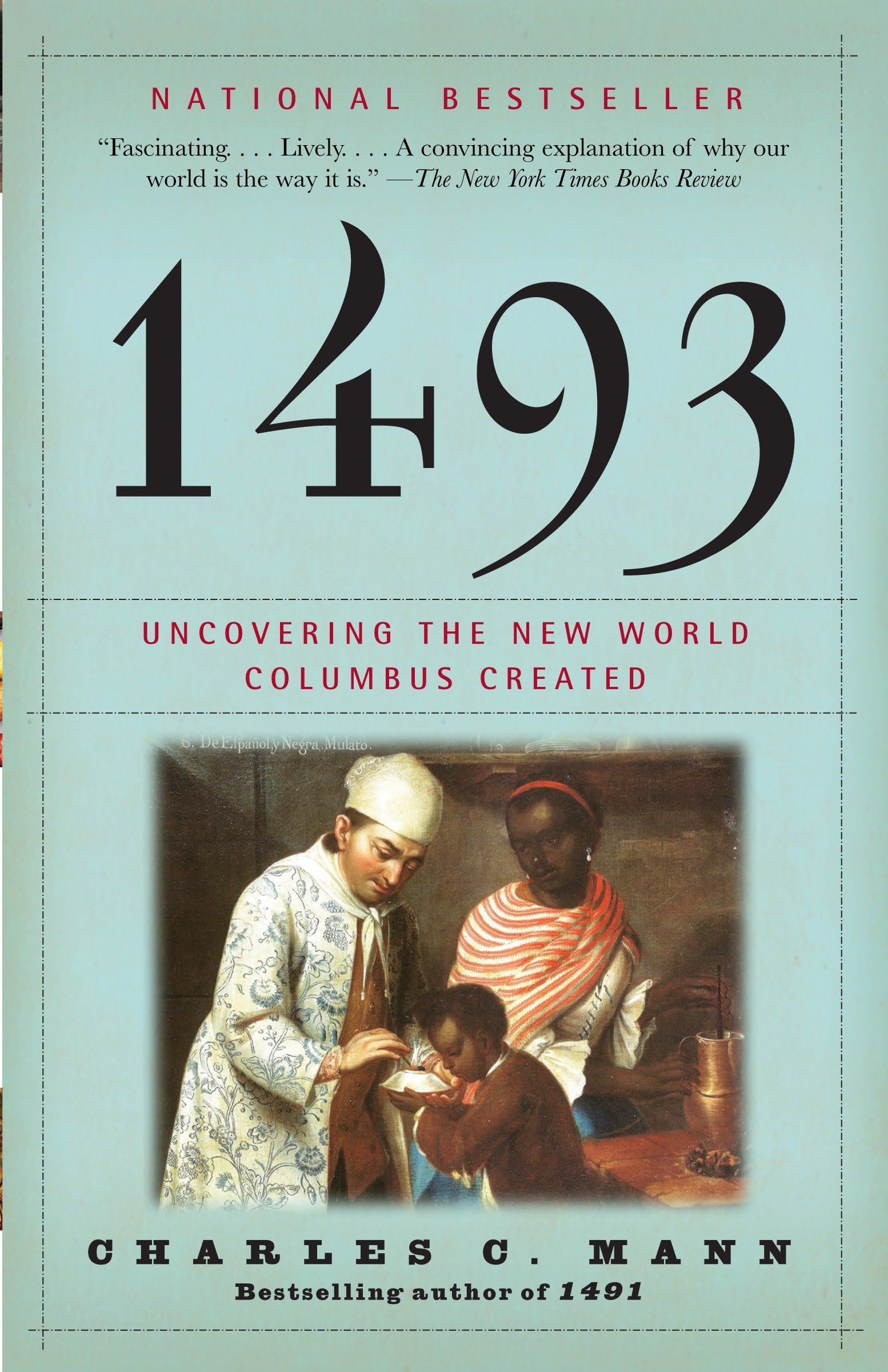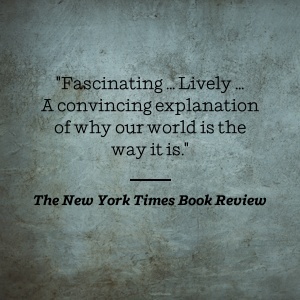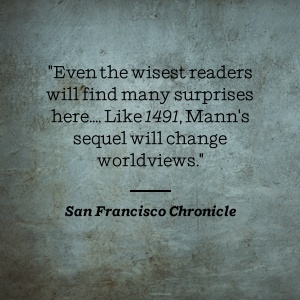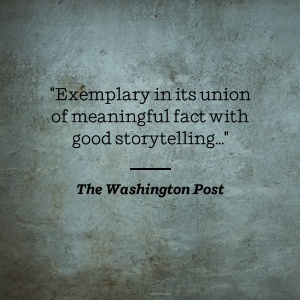

Full description not available



A**S
Great Reading, Mind Opening
This is a terrifically interesting and entertaining book, which presented me with at least two blockbuster ideas that changed the way I think about the past. I'll get to those in a minute, but first a few general points. Charles Mann is a science journalist:who seems to specialize in BIG topics. His 2005 book ("1491", which argues that the pre-Columbian population of the Americas was much larger and more sophisticated than generally assumed), was very well received. I enjoyed it so much, and thought it so valuable a book, that I was very anxious to read "1493"."1493" lived up to my (high) expectations. Mann is remarkable writer, with an extraordinary ability to present very complex facts and ideas in way that's not just accessible to the lay reader, it's fun for the lay reader. This isn't to say that the book isn't carefully researched -- the text is followed by almost 100 pages of footnotes, and throughout he cites and acknowledges the scientists and others from whom he has drawn information. It's just that Mann manages to combine a myriad of facts and hypotheses into a compelling narrative. And he often puts this in very concrete terms, focussing on individual people, commodities or events. It adds up to a fascinating read.It is also a very important one, with implications for the future as well as about the past. Mann's subject in this book is the Columbian Exchange, the sudden movement of plants, microbes, animals and people between the eastern and western hemispheres after Columbus' voyage to the Americas in 1492. A well known effect of this was the eastern hemisphere adoption of western hemisphere foods (tomatoes, potatoes, chocolate, coffee, and on and on). Another effect that's only been recently come to be widely understood is the devastating impact on the pre-Columbian population of the Americas; as many as 80% died in the epidemics that followed the introduction of diseases to which they had no immunity. But the population die-off and the exchange of plant species are not the only effects of the Columbian Exchange. Mann's book explores the myriad ways in which the Exchange -- globablization -- has shaped the world of today.Two things I learned from the book struck me particularly. First, like most Americans of my generation (older) I learned in school that the colonization of the Americas was carried out by white people, who moved into a largely uninhabited continent. "1491" took care of the uninhabited: "1493" takes care of the white. Mann says that from 1500 to 1840, about 3.4 million white Europeans emigrated to the Americas. Over the same period, about 11.7 million captive Africans were sent to the Americas. Except for New England, much of the United States and most of Latin American was far more black than white. (And probably in 1840 still more Indian/Native American than anything else). The racial balance changed as white immigration ramped up and as millions upon millions of blacks died too young, but the picture of early America looks very different to me now.Secondly, Mann discussed at length the 19th century ecological disaster that engulfed China. I had always assumed that the floods that killed so many millions in China had always happened, and were the result of geography. There have indeed always been floods, but their severity and human cost grew logarithmically in the 19th century. New crops led to more food and to rising population growth, and at the same time to more potential cash crops, increasing the pressure on existing land holdings, and leading to vast land clearances. That made the floods far worse when they came, undermining the political structure and compounding China's problems. This was interesting not just a light on the past, but as a warning signal for the future.The review is already too long, so, to sum it up: Great book!! Read it!! Give it to friends and family!!
D**N
"Slavery was the foundational institution of the Americas"
As a follow-up to his study of pre-Columbian America in 1491: New Revelations of the Americas Before Columbus, Mann now explores the consequences of the European conquest and large-scale settlement of the Americas and its impact on a global scale. This is well trod ground for the specialist, and Mann has little new to add to the disucssion. However, he does connect some dots that have not been closely looked at - particularly the global ecological / econcomic effects of the "Columbian Exchange" and the emergence of a new biological era, the "Homogenocene."The revolutionary text that first recognized the large scale effects the European conquest of the Americas had on the rest of the world, Alfred Crosby's The Columbian Exchange remains as the classic study that Mann seeks to add on to. Essentially, Mann (and Crosby before him) argue that prior to 1492, Europeans were largely confied to Europe, Africans to Africa, Asians to Asia and Americans to the Americas. Likewise the ecosystems of these parts of the world were largely independent of each other (I speak in broad terms; Jared Diamond's brilliant study on the geographical advantages Eurasia has over Africa and America, Guns, Germs, and Steel: The Fates of Human Societies provides more nuance to this statement.) With the arrival of Europeans and Africans, however, global ecological change takes place with tremendous consequences as disease and mega flora and fauna are introduced, and as a truly world economy begins.What Mann seeks to do here is illustrate how broadly the Columbain Exchange transformed the global economy: silver mined from the Americas weakened the Ming economy while simultaneously enriching Spain; Spain's newfound wealth led to political turmoil in Europe as it sought to throw its weight around; the introduction of new foods like the sweet potato and maize not only created a population explosion, it also led to political stability in Europe as famine became a smaller concern; global demand for sugar ecologically transformed the Americas as forests were destroyed (both to create arable land and to provide fuel to process sugar) as well as anthropolgically changed it as millions of Africans were brought to the New World as a labor force.Clearly there are a lot of moving parts here - to look at ecological, economic, demographic, agricultural and political changes on a global scale over a period of 200 years is a monumental task. In examining the systems and individuals that created and perpetuated these changes, it is all too easy to villify some and celebrate others. Mann walks a thin line as he neither praises nor condemns Columbus, Pizzaro, Cortez, Margarit, or any of the other explorers, conquorers, and econcomic innovators - in doing so, he runs the risk of alientating anyone who wants to pass judgement on this era. Similarly, given the encyclopedic nature of the undertaking, Mann really scratches the surface of a monumental topic. Recognizing this, he does a remarkable job of putting together a terribly complex puzzle and explains it in a way that readers can understand the gravity and imapct the Columbian Exchange has had on the world. Recommended.
N**I
A Fascinating and Engaging Read
After Columbus' voyage in 1492 the world suddenly became more connected and, consequently, more alike. This is the reason we find rubber trees in China, potatoes in Ireland, and malaria in Panama, but also the reason silver flooded the market and collapsed economies and the slave trade proliferated, resulting in slaves vastly outnumbering the controlling parties throughout the New World. Human beings, plants, animals, insects, bacteria and viruses were now traveling the world, arriving at places they've never been before and with unforeseen impacts. Charles C. Mann follows up his fascinating book, 1491: New Revelations of the Americas Before Columbus, with an equally fascinating look at the world we are more familiar with: the post-Columbian world, the one we know today. This is an engaging read, one that will answer a lot of questions you've probably never thought to ask, and will absolutely give you a better understanding of how the world got to be the world it is.
A**S
Unique and untold story. For sure worth the read!
My dad is a huge history lover, I got this for him for his birthday after he read and LOVED 1491. I swear he couldn't stop telling everyone how interesting the book was and how much he learned from it.I believe his exact words were "This gives an untold story of Columbus and the early America's"
Trustpilot
4 days ago
3 days ago